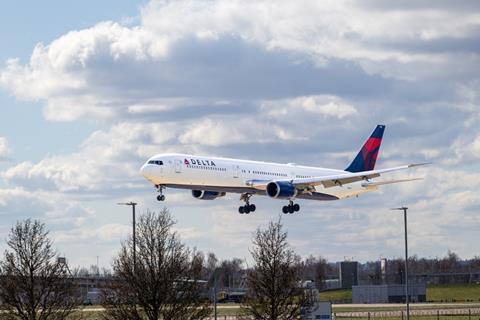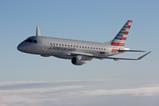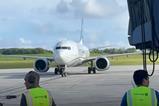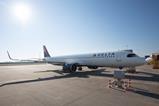Delta Air Lines is cutting passenger capacity and curbing fleet and workforce growth in response to slowing demand for air travel and a broadly-souring economic outlook.
Chief executive Ed Bastian, during Delta’s 9 April quarterly earnings call, described the airline’s efforts as focusing on “protecting margins and free cash flow” and asserting that it is built to weather times of economic difficulty.
“February and March reflected a much more challenging macro-environment than anyone initially planned for,” he says. “Coming into 2025, we were positioned for another year of strong growth.
“However, given broad economic uncertainty around global trade, growth has largely stalled.”

As recently as January, Delta boasted that it was on track to post its most-profitable year of operations in 2025 as it rode “accelerating” premium and international demand.
But with US President Donald Trump ramping up his strategy of targeting longtime trade partners with steep tariffs, Delta last month lowered its first-quarter financial forecast as it warned of sagging demand for air travel.
The major US carrier confirms that its business is feeling the effects of souring consumer sentiment, effectively scratching its prior financial performance expectations.
Bastian says that the slowdown is most apparent in the domestic market and Delta’s main cabins, noting “softness in both consumer and corporate travel”.
“While not immune in this environment, we do continue to see greater resilience in international and our diversified revenue stream, including premium and loyalty, reflecting the underlying strength of our core consumer,” he says.
Delta is working to keep year-on-year capacity growth roughly flat in the year’s second half and says fleet growth for the full year will be less than 1%.
Chief financial officer Dan Janki says that Delta’s fleet will grow by fewer than 10 aircraft “as we manage both retirements and deliveries”.
Delta now plans to accelerate retirements of older Boeing 757s and 767s, as well as Airbus A319s and A320s.
“Lower growth and accelerated aircraft retirements will drive incremental maintenance savings,” he says. “Additionally, we are adjusting plans around our workforce and supplier base to align with lower growth levels for the full year.
“We now expect our workforce to be below levels of last year, on natural attrition.”
The world economy is scrambling to adjust to steep new tariffs being imposed on nearly every country on the planet by the Trump administration. The heightened barriers to world trade have thrown markets into turmoil, with a days-long stock sell-off wiping out trillions of dollars in market value.
Underscoring the uncertainty of the situation, Trump on 9 April announced 90-day pauses on tariffs to most of the USA’s trade partners, sending US markets into a rally.
Airlines are watching warily for signs of slowing demand. Delta, the first major airline to report first-quarter results, is considered a bellwether of the US sector’s health.
Bastian emphasised that Delta is particularly well-equipped to manage periods of economic slowdown.
“Over the last 15 years, we’ve worked to diversify our business and differentiate ourselves from the industry,” Bastian says. ”During periods of uncertainty, our differentiators and structural advantages become even more apparent, helping to insulate our business and create durability in our financial performance.”
Even so, Delta executives expressed high levels of uncertainty about the months ahead.
“Given the recency of last week’s policy changes and market moves, it’s early to assess the impact on consumer and corporate travel demand for the June quarter,” Bastian says.
Delta’s guidance shows that second-quarter revenue is expected to range from down 2%, to up 2%, over the prior year.
It expects to earn profits of between $1.5 billion and $2 billion in the second quarter.
Glen Hauenstein, Delta’s president, says that the airline’s premium and international segments are continuing to “show greater resiliency”, with bookings “remaining strong” through the peak summer air travel period.
Delta reports a $240 million first-quarter profit, compared with a $37 million profit during the same three months of last year.
First-quarter revenue increased 2% over the prior-year period, to more than $14 billion.































